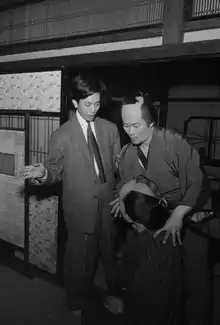Sun in the Last Days of the Shogunate
Sun in the Last Days of the Shogunate (幕末太陽傳 or 幕末太陽伝, Bakumatsu taiyōden) is a 1957 Japanese comedy film directed by Yūzō Kawashima with a screenplay by Kawashima, Shōhei Imamura and Keiichi Tanaka.[2] It was voted the fifth best Japanese film of all time in a poll of 140 Japanese critics and filmmakers conducted by the magazine Kinema Junpo in 1999.[3]
| Sun in the Last Days of the Shogunate | |
|---|---|
| Directed by | Yūzō Kawashima |
| Written by | Yūzō Kawashima, Shōhei Imamura, Keiichi Tanaka |
| Starring | Frankie Sakai Sachiko Hidari Yōko Minamida |
| Distributed by | Nikkatsu |
Release date |
|
Running time | 110 minutes[1] |
| Country | Japan |
| Language | Japanese |

Plot
It is set during the last days of the Bakumatsu era (1862), six years before the shogun Tokugawa Yoshinobu returned power to the Emperor. The plot is centered around the rogue city dweller Saheiji (played by comedian Frankie Sakai), who arrived to have fun with three friends. They visit a brothel in the Shinagawa entertainment district. After spending the night, he was forced to admit that he lacked money to pay. So he must stay in order to settle his debt. Saheiji seeks to outwit the inhabitants of a brothel in order to survive in straitened times.[4] Meanwhile, a group of samurai seek to destroy any foreigners that cross their path. Saheiji attracts all employees, from brothel owners to prostitutes, successfully resolves any disputes with clients by using his inherent brilliance, wit and fill his pockets. However, gradually it turns out that the seemingly life-loving Saheiji suffers from tuberculosis and his future is uncertain.
Notes
Parallels are drawn between the world of the samurai and the world of Kawashima's Japan. The hypocrisy surrounding prostitution, about to be outlawed in Japan at that time in 1950s Japan, the abuse of power, and financial greed at a time of crisis, are all portrayed.[5]
Cast
- Frankie Sakai as Saheiji
- Yōko Minamida as Koharu
- Sachiko Hidari as Osome
- Yujiro Ishihara as Takasugi Shinsaku
- Nobuo Kaneko as Denbei, the owner of the Sagami-ya
- Masumi Okada as Kisuke
- Tomio Aoki as Chusuke
- Shōichi Ozawa as Kinzō, the book lender
- Shōbun Inoue as Genta
- Toshio Takahara as Kaneji
- Izumi Ashikawa as Ohisa
- Akira Nishimura as Shinkō
- Taiji Tonoyama as Kurazō
- Hideaki Nitani as Shidō Monta (a.k.a. Inoue Kaoru)
- Akira Kobayashi as Kusaka Genzui
References
- http://www.jmdb.ne.jp/1957/cg002790.htm accessed 16 January 2009
- "日本大百科全書(ニッポニカ)「幕末太陽傳」の解説". kotobank. Retrieved 11 October 2021.
- "Hōga ōrutaimu besuto 100". My Cinema Theater. Retrieved 10 September 2011.
- Masters of Cinema
- Moviemail catalogue, April 2013, p.13
External links
- Sun in the Last Days of the Shogunate at IMDb
- New remaster Ver(2011) http://www.nikkatsu.com/bakumatsu/english.html